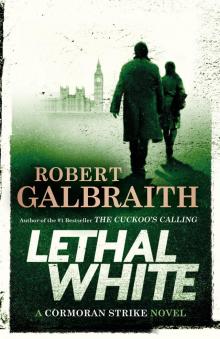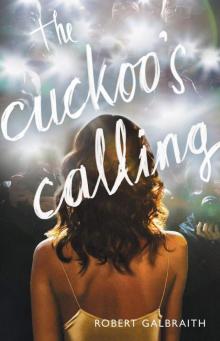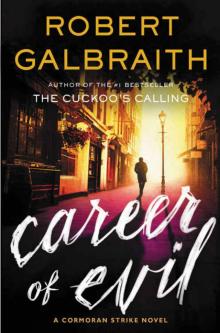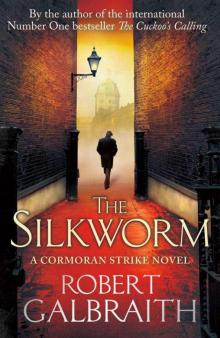- Home
- Robert Galbraith
Career of Evil Page 16
Career of Evil Read online
Page 16
At the precise moment Strike became aware that he was walking away from Denmark Street rather than towards it, he spotted a man in a beanie hat twenty yards away, skulking on the corner of Soho Square. The amber tip of the cigarette swiftly vanished as the man turned and began to walk hurriedly away.
“’Scuse me, mate!”
Strike’s voice echoed through the quiet square as he sped up. The man in the hat did not look back, but broke into a run.
“Oi! Mate!”
Strike, too, began to run, his knee protesting with every jolting step. His quarry looked back once then took a sharp left, Strike moving as fast as he could in pursuit. Entering Carlisle Street, Strike squinted ahead at the crowd clustered around the entrance of the Toucan, wondering whether his man had joined it. Panting, he ran on past the pub drinkers, drawing up at the junction with Dean Street and revolving on the spot, looking for his quarry. He had a choice of taking a left, a right or continuing along Carlisle Street, and each offered a multitude of doorways and basement spaces in which the man in the beanie hat could have hidden, assuming he had not hailed a passing cab.
“Bollocks,” Strike muttered. His stump was sore against the end of his prosthesis. All he had was an impression of ample height and breadth, a dark coat and hat and the suspicious fact that he had run when called, run before Strike could ask him for the time, or a light, or directions.
He took a guess and headed right, up Dean Street. The traffic swooshed past him in either direction. For nearly an hour Strike continued to prowl the area, probing into dark doorways and basement cavities. He knew this was almost certainly a fool’s errand, but if—if—they had been followed by the man who had sent the leg, he was clearly a reckless bastard who might not have been scared away from Robin’s vicinity by Strike’s ungainly pursuit.
Men in sleeping bags glared at him as he moved far closer than members of the public usually dared; twice he startled cats out from behind dustbins, but the man in the beanie hat was nowhere to be seen.
21
… the damn call came,
And I knew what I knew and didn’t want to know.
Blue Öyster Cult, “Live for Me”
Robin woke next day to a sore head and a weight in the pit of her stomach. In the time it took to roll over on unfamiliar, crisp white pillows, the events of the previous evening seemed to come crashing down on her. Shaking her hair out of her face she sat up and looked around. Between the carved posts of her wooden four-poster she made out the dim outlines of a room barely illuminated by the line of brilliant light between brocade curtains. As her eyes became accustomed to the gilded gloom she made out the portrait of a fat gentleman with mutton-chop whiskers, framed in gilt. This was the kind of hotel in which you took an expensive city break, not where you slept off a hangover with a few hastily snatched clothes in a holdall.
Had Strike deposited her here in elegant, old-fashioned luxury as preemptive compensation for the serious talk he would initiate today? You’re obviously in a very emotional place… I think it would be good if you took a break from work.
Two-thirds of a bottle of bad wine and she had told him everything. With a weak groan, Robin sank back on the pillows, covered her face with her arms and succumbed to the memories that had regained all their power now that she was weak and miserable.
The rapist had worn a rubber gorilla mask. He had held her down with one hand and the weight of a whole arm on her throat, telling her she was about to die as he raped her, telling her he was going to choke the fucking life out of her. Her brain a scarlet cavity of screaming panic, his hands tightening like a noose around her neck, her survival had hung on her ability to pretend that she was already dead.
Later there had been days and weeks when she had felt as though she had in fact died, and was trapped in the body from which she felt entirely disconnected. The only way to protect herself, it had seemed, was to separate herself from her own flesh, to deny their connection. It had been a long time before she had felt able to take possession again.
He had been soft-spoken in court, meek, “yes, your honor,” “no, your honor,” a nondescript middle-aged white man, florid in complexion except for that white patch under his ear. His pale, washed-out eyes blinked too often, eyes that had been slits viewed through the holes in his mask.
What he had done to her shattered her view of her place in the world, ended her university career and drove her back to Masham. It forced her through a grueling court case in which the cross-examination had been almost as traumatic as the original attack, for his defense was that she had invited him into the stairwell for sex. Months after his gloved hands had reached out of the shadows and dragged her, gagging, into the cavity behind the stairs, she had not been able to stand physical contact, not even a gentle hug from a family member. He had polluted her first and only sexual relationship, so that she and Matthew had had to start again, with fear and guilt attending them every step of the way.
Robin pressed her arms down over her eyes as though she might obliterate it all from her mind by force. Now, of course, she knew that the young Matthew, whom she had considered a selfless paragon of kindness and understanding, had in fact been cavorting with a naked Sarah in his student house in Bath while Robin lay on her lonely bed in Masham for hours at a stretch, staring blankly at Destiny’s Child. Alone in the sumptuous quiet of Hazlitt’s, Robin contemplated for the first time the question of whether Matthew would have left her for Sarah, had she been happy and unharmed, or even whether she and Matthew might have grown naturally apart if she had completed her degree.
She lowered her arms and opened her eyes. They were dry today; she felt as though she had no tears left to weep. The pain of Matthew’s confession no longer pierced her. She felt it as a dull ache underlying the more urgent panic about the damage she feared she might have done to her work prospects. How could she have been so stupid as to tell Strike what had happened to her? Hadn’t she already learned what happened when she was honest?
A year after the rape, when the agoraphobia had been overcome, when her weight was nearly back to normal, when she was itching to get back out into the world and make up the time she had lost, she had expressed a vague interest in “something related” to criminal investigative work. Without her degree and with her confidence so recently shredded, she had not dared voice aloud her true desire to be some kind of investigator. A good thing too, because every single person she knew had tried to dissuade her even from her tentatively expressed desire to explore the outer reaches of police work, even her mother, usually the most understanding of creatures. They had all taken what they thought a strange new interest as a sign of continuing sickness, a symptom of her inability to throw off what had happened to her.
It was not true: the desire had long predated the rape. At the age of eight she had informed her brothers that she was going to catch robbers and had been roundly mocked, for no better reason than that she ought to be laughed at, given that she was a girl and their sister. Though Robin hoped that their response was not a true reflection of their estimate of her abilities, but based on a kind of collegiate male reflex, it had left her diffident about expressing her interest in detective work to three loud, opinionated brothers. She had never told anyone that she had chosen to study psychology with a secret eye towards investigative profiling.
Her pursuit of that goal had been utterly thwarted by the rapist. That was another thing he had taken from her. Asserting her ambition while recuperating from a state of intense fragility, at a time when everyone around her appeared to be waiting for her to fall apart again, had proved too difficult. Out of exhaustion and a feeling of obligation to the family that had been so protective and loving in her time of greatest need she had let a lifelong ambition fall by the wayside, and everyone else had been satisfied to see it go.
Then a temping agency had sent her by mistake to a private detective. She should have been there a week, but she had never left. It had felt like a miracle. Somehow, by luck, then
through talent and tenacity, she had made herself valuable to the struggling Strike and ended up almost exactly where she had fantasized being before a total stranger had used her for his perverse enjoyment like a disposable, inanimate object, then beaten and throttled her.
Why, why, had she told Strike what had happened to her? He had been worried about her before she revealed her history: now what? He would decide she was too fragile to work, Robin was sure of it, and from there it would be a swift, short step to the sidelines, because she was unable to take on all the responsibilities he needed a workmate to shoulder.
The calm Georgian room’s silence and solidity was oppressive.
Robin struggled out from under the heavy covers and crossed the sloping wooden floorboards to a bathroom with a claw-footed bath and no shower. Fifteen minutes later, as she was dressing, her mobile, which she had mercifully remembered to charge the previous night, rang on the dressing table.
“Hi,” said Strike. “How are you?”
“Fine,” she said, her voice brittle.
He had called to tell her not to come in, she knew it.
“Wardle’s just phoned. They’ve found the rest of the body.”
Robin sat down hard on the needlepoint stool, both hands clutching the mobile to her ear.
“What? Where? Who is she?”
“Tell you when I pick you up. They want to talk to us. I’ll be outside at nine. Make sure you eat something,” he added.
“Cormoran!” she said, to stop him hanging up.
“What?”
“I’m still… I’ve still got a job, then?”
There was a slight pause.
“What’re you talking about? Of course you’ve still got a job.”
“You don’t… I’m still… nothing’s changed?” she said.
“Are you going to do as you’re told?” he asked. “When I say nothing after dark, you’re going to listen from now on?”
“Yes,” she said, a little shakily.
“Good. I’ll see you at nine.”
Robin breathed a deep, shuddering sigh of relief. She was not finished: he still wanted her. As she went to replace the mobile on the dressing table she noticed that the longest text message that she had ever received had arrived overnight.
Robin, I can’t sleep for thinking about you. You don’t know how much I wish it hadn’t happened. It was a shitty thing to do and there’s no defense. I was 21 and I didn’t know then what I know now: that there’s nobody like you and that I could never love anyone else as much as I love you. There’s never been anyone apart from you since then. I’ve been jealous of you and Strike and you might say I don’t have the right to feel jealous because of what I did but maybe on some level I think you deserve better than me and that’s what’s been getting to me. I only know I love you and I want to marry you and if that’s not what you want now then I’ll have to accept that but please Robin just text me and let me know you’re OK, please. Matt xxxxxxx
Robin put the mobile back on the dressing table and continued dressing. She ordered a croissant and coffee from room service and was surprised how much better food and drink made her feel when they arrived. Only then did she read Matthew’s text again.
… maybe on some level I think you deserve better than me and that’s what’s been getting to me…
This was touching, and most unlike Matthew, who frequently expressed the view that citing subconscious motivation was no more than chicanery. Hard on the heels of that thought, though, came the reflection that Matthew had never cut Sarah out of his life. She was one of his best friends from university: embracing him tenderly at his mother’s funeral, dining out with them as part of a cozy foursome, still flirting with Matthew, still stirring between him and Robin.
After a brief inner deliberation, Robin texted back:
I’m fine.
She was waiting for Strike on the doorstep of Hazlitt’s, neat as ever, when the black cab drew up at five to nine.
Strike had not shaved, and as his beard grew with vigor his jaw looked grimy.
“Have you seen the news?” he asked as soon as she had got into the cab.
“No.”
“Media have just got it. Saw it on the telly as I left.”
He leaned forward to slide shut the plastic divider between themselves and the driver.
“Who is she?” asked Robin.
“They haven’t formally ID’d her yet, but they think she’s a twenty-four-year-old Ukrainian woman.”
“Ukrainian?” said Robin, startled.
“Yeah.” He hesitated, then said, “Her landlady found her dismembered in a fridge-freezer in what looks like her own flat. The right leg’s missing. It’s definitely her.”
The taste of Robin’s toothpaste in her mouth turned chemical; croissant and coffee churned in her stomach.
“Where’s the flat?”
“Coningham Road, Shepherd’s Bush. Ring any bells?”
“No, I—oh God. Oh God. The girl who wanted to cut off her leg?”
“Apparently.”
“But she didn’t have a Ukrainian name, did she?”
“Wardle thinks she might’ve been using a fake one. You know—hooker name.”
The taxi bore them down Pall Mall towards New Scotland Yard. White neoclassical buildings slid past the windows on both sides: august, haughty and impervious to the shocks of frail humanity.
“It’s what Wardle expected,” said Strike after a long pause. “His theory was that the leg belonged to a Ukrainian prostitute last seen with Digger Malley.”
Robin could tell that there was more. She looked at him anxiously.
“There were letters from me in her flat,” said Strike. “Two letters, signed with my name.”
“But you didn’t write back!”
“Wardle knows they’re fake. Apparently they’ve spelled my name wrong—Cameron—but he’s still got to get me in.”
“What do the letters say?”
“He wouldn’t tell me over the phone. He’s being pretty decent,” said Strike. “Not being a dick about it.”
Buckingham Palace rose up ahead of them. The gigantic marble statue of Queen Victoria frowned down on Robin’s confusion and her hangover, then slid out of view.
“They’re probably going to ask us to look at pictures of the body to see whether we can ID her.”
“OK,” said Robin, more stoutly than she felt.
“How are you?” Strike asked.
“I’m fine,” she said. “Don’t worry about me.”
“I was going to call Wardle this morning anyway.”
“Why?”
“Last night, walking away from Hazlitt’s, I saw a big guy in a black beanie hat lurking down a side street. There was something about his body language I didn’t like. I called out to him—I was going to ask him for a light—and he scarpered. Don’t,” said Strike, though Robin had not made a sound, “tell me I’m jumpy or imagining things. I think he followed us, and I’ll tell you something else—I think he was in the pub when I arrived. I didn’t see his face, just the back of his head as he left.”
To his surprise, Robin did not dismiss him. Instead she frowned in concentration, trying to recall a vague impression.
“You know… I saw a big bloke in a beanie hat somewhere yesterday, too… yeah, he was in a doorway on Tottenham Court Road. His face was in shadow, though.”
Strike muttered another oath under his breath.
“Please don’t tell me to stop working,” said Robin in a more high-pitched voice than usual. “Please. I love this job.”
“And if the fucker’s stalking you?”
She could not repress a frisson of fear, but determination overrode it. To help catch this animal, whoever he was, would be worth almost anything…
“I’ll be vigilant. I’ve got two rape alarms.”
Strike did not look reassured.
They disembarked at New Scotland Yard and were shown upstairs at once, into an open-plan office where Wardle stood
in his shirtsleeves, talking to a group of subordinates. When he saw Strike and Robin he left his colleagues at once and led the detective and his partner into a small meeting room.
“Vanessa!” he called through the door as Strike and Robin took seats at an oval table, “have you got the letters?”
Detective Sergeant Ekwensi appeared shortly afterwards with two typewritten sheets protected in plastic slips and a copy of what Strike recognized as one of the handwritten letters that he had given Wardle in the Old Blue Last. Detective Sergeant Ekwensi, who greeted Robin with a smile that the latter again found disproportionately reassuring, sat down beside Wardle with a notebook.
“You want coffee or anything?” Wardle asked. Strike and Robin shook their heads. Wardle slid the letters across the table to Strike. He read both before pushing them sideways to Robin.
“I didn’t write either of them,” Strike told Wardle.
“I didn’t think so,” said Wardle. “You didn’t answer on Strike’s behalf, Miss Ellacott?”
Robin shook her head.
The first letter admitted that Strike had indeed arranged the removal of his own leg because he wished to be rid of it, confessing that the story of an Afghan IED was an elaborate cover-up, and that he did not know how Kelsey had found this out, but implored her not to tell anybody else. The fake Strike then agreed to help her with her own “encumbrance” and asked where and when they could meet face to face.
The second letter was brief, confirming that Strike would come and visit her on the third of April at 7 p.m.
Both of the letters were signed Cameron Strike in thick black ink.
“That,” said Strike, who had pulled the second letter back towards him after Robin had finished reading it, “reads as though she wrote back to me suggesting a time and place.”

 Lethal White
Lethal White The Cuckoo's Calling
The Cuckoo's Calling Career of Evil
Career of Evil The Silkworm
The Silkworm